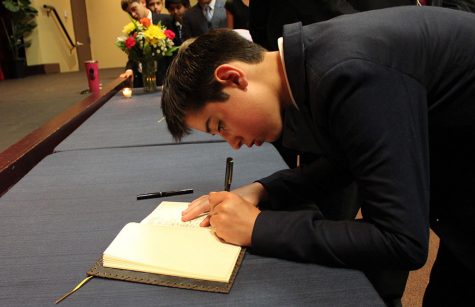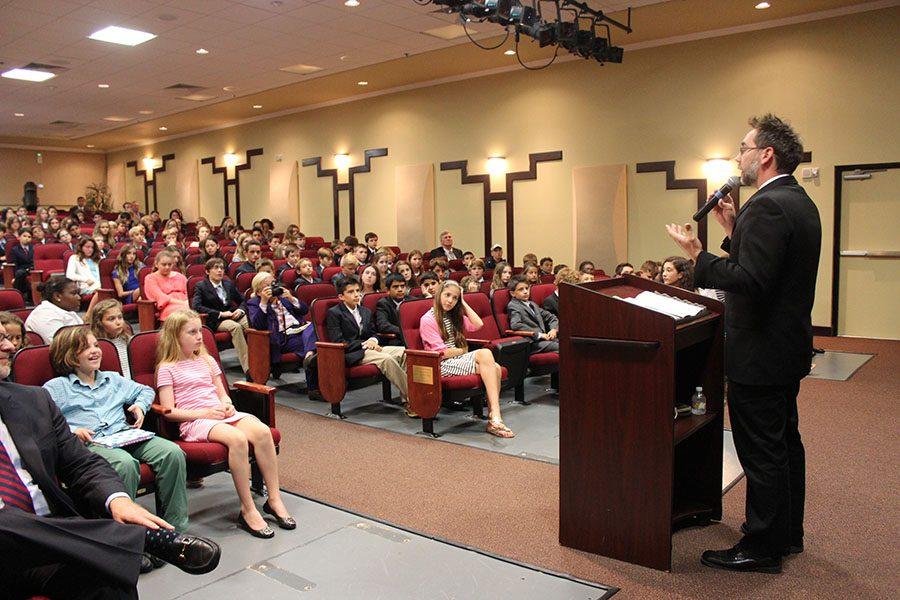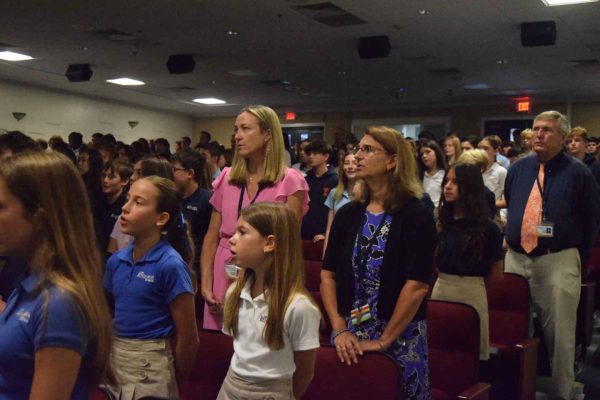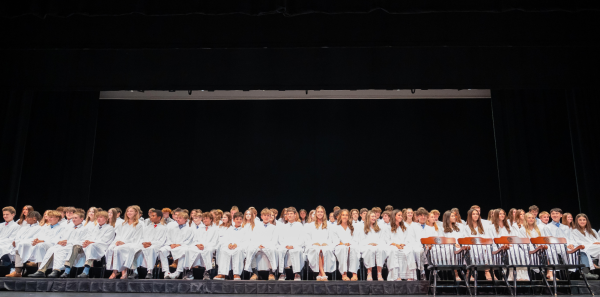Little Things Make a Big Difference
The recent Honor Code Assembly highlighted how one’s honor is maintained through the simple choices made each day.
Mr. Crisafi addresses the students during the Honor Code Assembly on Thursday, September 8, 2016.
Sometimes, it’s just the little things. On a recent trip to a Tallahassee middle school, some of the Florida State University football players and coaches visited students and faculty. As they sat down to eat lunch in the cafeteria, one of the team’s wide receivers, Travis Rudolph, noticed a sixth-grade boy, Bo Paske, sitting by himself at a table. Rudolph went over to the table, sat down next to Paske, and ate lunch with him. According to a September 1 BBC news article, Bo Paske’s mother was “moved to tears because [she] didn’t have to worry if [her] son ate lunch alone.” Paske is autistic and often eats alone because of his disability. However, after Rudolph went over and sat down with him, Paske hasn’t had any trouble finding someone to sit with because he sat next to a hero in many people’s eyes. This kind and honorable act went viral, popping up on news sites all over the world. It even made the rounds at Benjamin as advisory groups watched the video and talked about why such kind gestures are important.
Such an act is an example of the “small things” Mr. Nicholas Crisafi alluded to in his speech about honor at the Middle School’s annual Honor Code Assembly on September 8. Every year, Head of Middle School Mr. Charles Hagy chooses one or two teachers to speak at the assembly. This year he chose Crisafi, the division’s integration technology coordinator.
“I usually ask [the teachers around school] who they think is the most honorable, and [this year] Mr. Crisafi was pretty much the universal [choice]. Everyone knows that he is honorable as a father, as a teacher, on campus and off campus.”
In his speech, Mr. Crisafi talked about “the importance of honor and how it’s been devalued in many aspects of our society today.” He mentioned how, on a recent trip to Colonial Williamsburg in Virginia, he learned that citizens of 18th-century America would often be placed in the stocks if they failed to keep their word or broke a promise. “There was a time in this nation’s history when that virtue really meant something,” said Crisafi. He also reminded students that it’s the small moments and seemingly insignificant choices in one’s life that determine an individual’s honor and reputation. “I think there are rules that we as people need to live by, and when you can look at the person next to you and know that they are trying to aspire to the same ideals as you, it allows you to hold each other accountable and make each other better people. That’s what TBS is all about – helping students grow into the best versions of themselves by learning from one another and helping one another.”

Seventh grader Jacob Steinger signs his name to the honor code book, promising to uphold Benjamin’s Honor Code pledge.
The Honor Code assembly is a formal ceremony that has the students recite the School’s honor code (“I will maintain my self respect. I will not lie, cheat, or steal, nor tolerate anyone who does.”), and then sign their name in a book, binding them to that promise.
“I think the honor code assembly reminds us of that essential element that glues the other [TBS character] traits together,” said Hagy. “When you have situations that come up at school and off campus in life, you have to ask yourself ‘is that honorable?’. [I hope one day that students] will forget [about] school and just say ‘I will not lie, cheat or steal, nor tolerate anyone who does.’”
Although it may not be the most fun assembly, the students still think it’s an important tradition.
“I think the honor code is necessary because it reminds you of your responsibilities as a student,” said seventh grader Emeline Smith, “and makes sure you are living up to those traits.”
Sixth grader Alexander Smyth explained that he “thinks the honor code is necessary to so we can [hold ourselves] to a high standard.” Examples of honor and integrity have not been lost on Smyth. “I have seen someone ask another person to move because they could see their test,” he said.
“It sets boundaries and goals for the students, [and] its overall purpose is helpful,” said eighth grader Julia Kirschenbaum. “I have seen many kids turn down opportunities to cheat, and accept a zero instead.”
So whether it’s picking up someone’s books, refusing to cheat, or sitting with someone who is alone at lunch, such small gestures often add up and, in the words of Crisafi, “determine how big you really are.”






Jakob Mendelsohn • Sep 23, 2016 at 11:11 am
Nice job on your article! It was very intresting